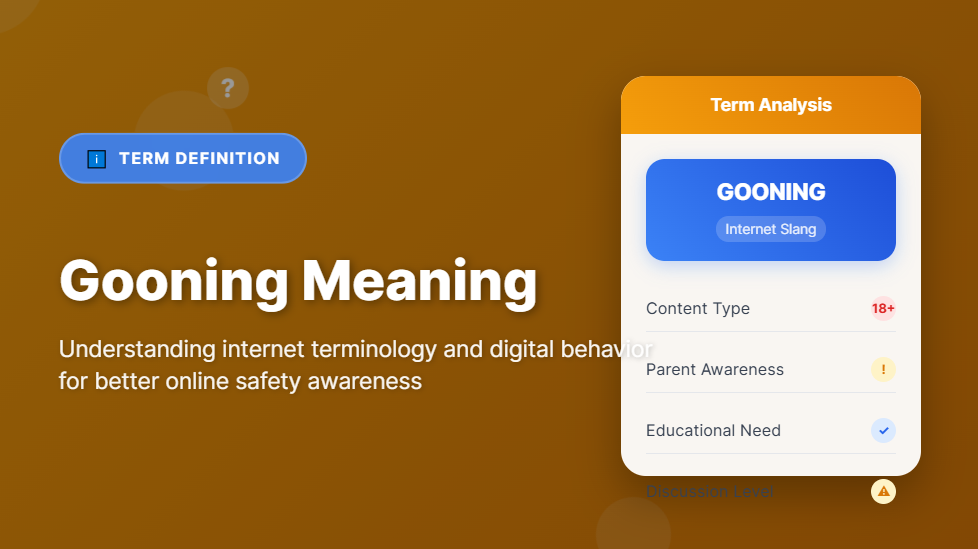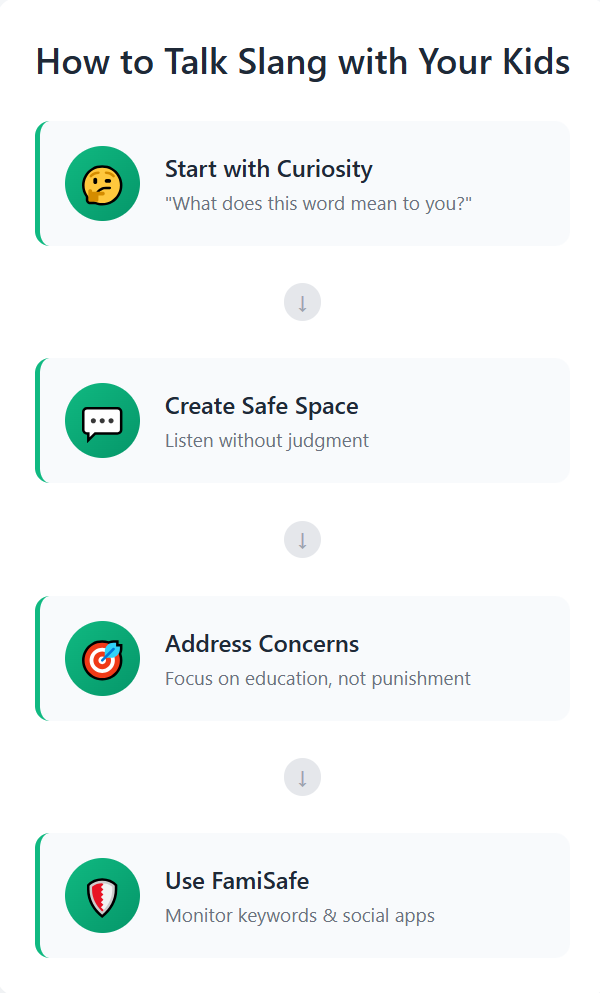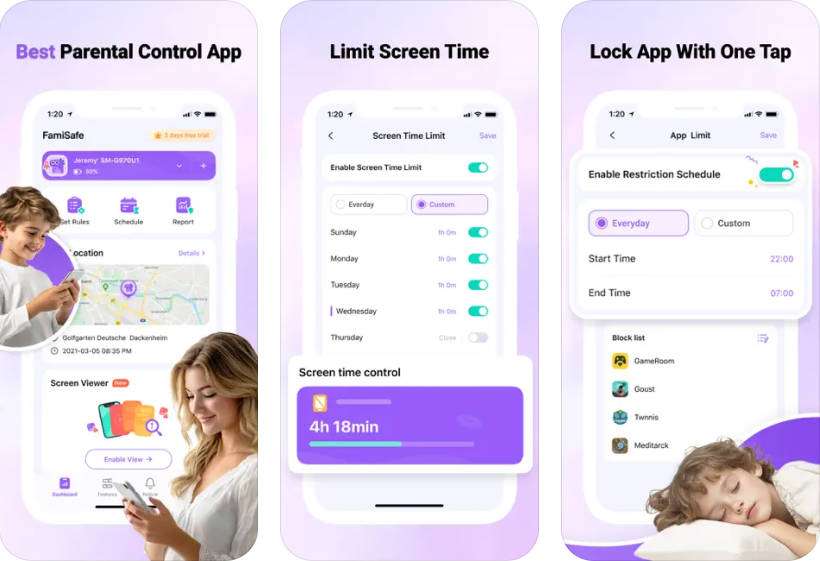If you've heard your teen or preteen say "gooning" and wondered what it means, you're not alone. This Gen Z slang term has multiple meanings depending on the context, and understanding them is crucial for every parent navigating today's digital landscape. While some uses of "gooning" are harmless internet slang, others carry adult connotations that require parental awareness.
In this article, we’ll break down the gooning meaning, explore how it's used on TikTok and in Gen Z slang, and offer practical tips for talking to your kids about internet lingo. Whether you're seeing it in a text or a video caption, being aware of terms like what does gooning mean helps you stay connected and vigilant. Let’s dive in. 🚨

Table of Content
Part 1: What Does Gooning Mean?
Gooning is a slang term that can mean different things depending on context and audience. On Urban Dictionary, it's often described as the act of masturbating while watching pornography — typically involving intense focus or extended sessions. However, in more casual or humorous contexts, especially among Gen Z, the term has evolved to sometimes mean "goofing off" or acting foolishly.
Here’s how gooning meaning breaks down across platforms:
- TikTok: Often used playfully or ironically, like when someone dances awkwardly or acts silly on camera.
- Urban Dictionary: Refers to self-stimulation, often with a humorous or crude tone.
- In Text/Slang: Can mean either acting goofy or engaging in inappropriate behavior, depending on context.
It's important to note that while gooning meaning slang might be used casually among teens, parents should be aware of the more explicit connotations. Understanding what does gooning mean Gen Z uses is essential for monitoring your child’s online behavior and ensuring they're not exposed to inappropriate content.
✅ Tip: Always consider the context. If you see “gooning” in a TikTok caption, look at the video content to determine if it’s innocent fun or something more suggestive. And the similar slang like Thicc also should be attentioned!
- Web Filter & SafeSearch
- Screen Time Limit & Schedule
- Location Tracking & Driving Report
- App Blocker & App Activity Tracker
- YouTube & TikTok History Monitor & App Blocker
- Social Media Texts & Porn Images Alerts
- Works on Mac, Windows, Android, iOS, Kindle Fire
Part 2: How Gen Z Uses Gooning Today?
Gen Z has largely adopted the playful, innocent meaning of "gooning" across mainstream social media platforms. Understanding how young people actually use this term helps parents distinguish between harmless slang and potentially concerning content.
TikTok and Instagram Usage 📱
On TikTok and Instagram, teens primarily use "gooning" in its traditional sense. Gen Z might use "gooning" to describe being in a state where they consume their attention. That means they are absorbed in a video game, social media, or even just zoning out in general.、
You'll often see content where young people describe themselves as "gooning" while:
- Playing video games for hours
- Binge-watching series or YouTube videos
- Getting completely absorbed in social media scrolling
- Acting silly or dramatic for entertainment
A TikTok-like video may picture someone "gooning" by pulling weird faces, acting wildly, and dancing. It may include all sorts of foolishness to amuse the audience. This usage represents harmless self-expression and humor.
Here’s how to interpret the gooning meaning on TikTok:
| Context | Meaning |
| Public videos | Usually playful, harmless behavior |
| Private messages | Could imply something more adult |
| Comments section | Often used for shock humor or sarcasm |
Context Matters Across Platforms 🎯
The platform and community significantly influence how "gooning" appears. The term may be used in sports fan communities. Young people might post videos supporting Arsenal and use "#Gooner" as a hashtag. Therefore, gooning meaning on TikTok and Youtube is generally safe.
However, parents should remain vigilant about different contexts:
- Public social media: Usually safe, referring to silly behavior or sports fandom
- Private messages: Could involve more mature discussions
- Adult-oriented platforms: May carry explicit meanings inappropriate for minors
The terms edging and gooning have been adopted by Generation Z and older Gen Alpha as brain rot terminology, gaining popularity on TikTok, often without full understanding of adult connotations.
Generation Gap in Understanding
Many teens use "gooning" without knowing its adult meanings, similar to how previous generations adopted slang without understanding all contexts. While on apps like TikTok, the term Gooning is much more positive and playful. This creates both opportunities and challenges for parents:
- Opportunities: Most teen usage is innocent and represents normal language evolution
- Challenges: Teens might unknowingly encounter or use terms with adult meanings
The key lies in maintaining open dialogue about online language and helping teens navigate digital spaces safely.
Part 3: How to Talk Slang with Your Kids
Talking to your child about slang like “gooning” doesn’t have to be awkward — it can actually strengthen your relationship.

Here’s how to approach the conversation:
Start with Genuine Curiosity 🤔
Rather than interrogating your teen, approach slang conversations with authentic interest. Try phrases like:
- "I keep hearing this word online – what does it mean to you?"
- "Help me understand what you and your friends mean when you say..."
- "I want to make sure I'm not misunderstanding something I heard"
Ask your teen. Most teens love sharing their world if you approach it with curiosity. This approach positions you as someone seeking to understand rather than someone ready to judge or punish.
Create Safe Discussion Spaces
Establish regular check-ins about online experiences without making them feel like interrogations. Share your own learning process: "I'm trying to keep up with how language changes online – it's actually pretty fascinating how quickly new words spread."
Acknowledge the generation gap honestly: "I know I don't always understand the context of what you're saying, but I want to make sure you're safe and that we can talk about anything confusing you encounter."
Address Concerning Content Appropriately ⚠️
When you discover potentially inappropriate slang usage, focus on education over punishment:
- Explain context differences: "This word means different things in different places online"
- Discuss digital footprints: "Sometimes words can be misunderstood by others"
- Emphasize safety: "Let's talk about recognizing when conversations become inappropriate"
FamiSafe: Supporting Safe Digital Communication 🛡️
While open communication forms the foundation of digital safety, parental control tools like FamiSafe provide additional protection and monitoring capabilities. FamiSafe's Social App Detection feature helps parents stay informed about their teens' social media activities without being overly intrusive.

FamiSafe features for slang-related safety:
- Keyword monitoring: Get alerts when concerning terms appear in messages
- Social media oversight: Monitor app usage patterns and time spent
- Safe search protection: Block inappropriate content across browsers
- Screen time management: Ensure balanced digital habits
FamiSafe works as a safety net, alerting parents to potential concerns while allowing teens appropriate digital freedom. The app recognizes that modern parenting requires balancing trust with protection.
Getting started with FamiSafe:
- Download the app from the App Store or Google Play
- Create your family account and connect devices
- Set up keyword alerts for terms like "gooning" and related slang
- Customize privacy settings based on your teen's age and maturity level
This approach combines the personal connection of direct communication with the technological support needed for comprehensive digital safety.
🎯 Bonus Tip:
Create a “Teen Slang Dictionary” together. Let your child teach you the latest terms — it’s a fun way to bond and stay informed.
Conclusion
Understanding the gooning meaning is more than just decoding slang — it’s about staying connected to your child’s digital world. Whether it’s used playfully on TikTok or carries a more adult connotation, knowing how Gen Z uses “gooning” empowers you to guide your child responsibly. From recognizing the gooning meaning on TikTok to having open conversations about internet slang, staying informed is key. Tools like FamiSafe can give you peace of mind by helping you monitor your child’s online activity and ensuring they’re engaging safely. Remember, the goal isn’t to police your child — it’s to protect and support them.


